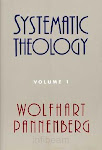This is an essay on the nature of doctrine. References are to Jaroslav Pelikan’s monographs on the development of Christian doctrine. Reference (3:241) would refer to volume 3, page 241.
1. Doctrine is “important”
2. Doctrine and mystery
3. The inadequacy of doctrine
4. The inevitability of doctrine
5. The scope of doctrine
6. “Hierarchies” of doctrine
7. The relation of words and reality
8. Liturgy as the fulfillment of doctrine
9. Love as the fulfillment of doctrine
-- -- --
Love as the Fulfillment of Doctrine
Simeon the New Theologian thought some monks needed to hear that “asceticism without love is in vain” (2:258). The same can be said to apply to doctrine: without love, true meaning and fulfillment of doctrine escapes us.
“Do not,” Simeon admonished his brethren, “try to describe ineffable matters by words alone, for this is an impossibility… But let us contemplate such matters as activity, labor, and fatigue… In this way we shall be taught the meaning of such things as the sacred mysteries” (2:258).
Just as doctrine is incommunicable apart from liturgy, doctrine is incommunicable apart from love. Love in action is the most appropriate way to articulate a truth that defies positive verbal formulation.
The “doctrinal explanations” of scholastic and speculative theology cannot do justice to mystical theology, because the ecstatic love that “consists in the experiential perception of the union of the soul, with God as its supreme object and goal, can in no way be communicated [tradi] through doctrine,” as Gerson put it (4:65).
Still it is essential to remember that there exists a tradition that does not separate, though it may distinguish between, “scholastic theology” and “mystical theology”; I hope to cling to this tradition. Doctrine needs to have experience as its “companion” (4:65).
But doctrine can “protect the experience”. For exacmple, as in the case of the mystical experience of union with God which, on the subjective level, can sometimes compromise the uniqueness of both God and the individual person (4:66). In this sense “mere practice” isn’t sufficient either (5:151-152). The truer the theology, the truer the experience.
However, in another sense the “right order of things” is “first do, then teach”, to quote Bede (3:13), for as earlier theologians have said, practice was the basis of theory. Gregory of Nazianzus’s epitaph of Basil the Great read, “his speech was like thunder because his life was like lightning” (5:55). This has served as a good guiding line for those who have wanted to hold on to the right relation between doctrine and life: thunder follows lightning.
Maximus distinguished between “commandments” and “doctrines”, and said the former were the prerequisites for the latter (2:8-9). Whatever the precise nature of the relation, at least this much is sure: the connection between orthodoxy and moral obedience has always been “a close one” (3:24).
Isidore of Seville’s comment about faithful preachers serves as a salutary model for all Christians in all times: “a shining example both in doctrine and in life,” for “the former without the latter made a man arrogant while the latter without the former made him useless” (3:13).
It is a shame to end this essay in a paradoxical accent. But the nature of things has not permitted any other way.
“The invisible things of God,” according to Hugh of Saint-Victor, “can only be believed, but cannot in any way be comprehended.” They transcend all analogy and likeness, whether of soul or of the body, and therefore “their very substance is the faith by which they are believed” (3:215). Or, as Balduinus said, faith was “the certain apprehension of unchangeable truth”, a comprehension that “exceeds all the experience of the senses and transcends all the conjectures of human reason” and that deserved to be called “knowledge” in the fullest sense (3:215).
Jean the Gerson’s approach was: “seek, through reasons based on the true faith, to understand the nature of God” and at the same time “hold principally to the love of God … without lofty inquiry” (4:63).
Doctrine is inadequate and inevitable; I must not inquire and yet inquire: Hier stehe ich und kann nicht anderes.
1 month ago







No comments:
Post a Comment